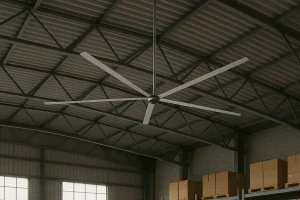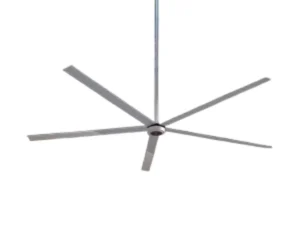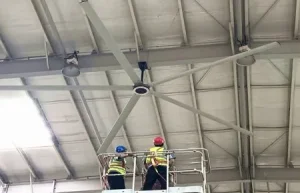Many factories, gyms, and warehouses suffer from poor ventilation and rising energy costs. This situation can stunt productivity, cause discomfort, and push overhead expenses to uncomfortable levels. Fortunately, there’s a simple and effective solution: installing an industrial ceiling fan can dramatically improve airflow, cut costs, and elevate employee well-being.
Yes, industrial ceiling fans are a worthwhile investment. They provide big ceiling coverage at low speed, moving a lot of air across large spaces. By circulating air effectively, they help cool your facility, reduce reliance on HVAC, and cut energy costs. Whether in a warehouse or a busy gym, these fans ensure more balanced temperatures, less hot spots, and a more pleasant environment for everyone.

industrial ceiling fan
An industrial ceiling fan differs from a standard home-based ceiling fan in scale, motor capability, and the amount of air it can move. It’s typically designed for spaces such as large warehouse buildings, sports centers, or even a garage journal workshop. The idea is straightforward: push out a high volume of airflow at a low speed, creating a balanced, comfortable climate that fosters higher productivity and cost savings.
Unlike ceiling fans without industrial specs, an industrial ceiling variant usually features more robust components. These might include fan blades built from heavier-gauge metals or advanced composite materials, a stronger fan motor, and a design that supports stable rotation across bigger diameters. Because industrial fans are used in varied conditions, from manufacturing floors to sporting arenas, they are fans designed to endure extended run times and harsh environments.
You might’ve heard of an hvls fan—short for High Volume Low Speed. This is a specific type of industrial fans approach, with diameters typically exceeding 8 feet. The large blades rotate slowly yet manage to circulate tremendous amounts of air across thousands of square feet. Essentially, an HVLS system is an industrial ceiling fan on steroids, known for consistent air circulation and energy efficiency, delivering a cool environment for employees or visitors.
The term “big ass fan” often references a brand. But in casual discussion, “big ass” can also describe any industrial ceiling fan with an impressive blade diameter that moves a lot of air. These fans stand apart from typical home-based fans, easily overshadowing the coverage of a smaller, more decorative ceiling fan.
HVLS, or High Volume Low Speed, emphasizes gentle but extensive air movement. A single HVLS industrial ceiling fan can handle an entire gym or big warehouse. These fans rotate at a low speed, delivering a cool breeze that can reduce indoor temperatures by several degrees. Because they handle a significant volume of air, they make your environment feel cooler, especially on hot summer days. And yes, they’re absolutely capable of pushing out enough air to maintain a comfortable atmosphere, even in massive open spaces.
(Helpful Table: Big Ass Fan vs. Standard Ceiling Fan)
| Feature | Big Ass Fan / HVLS | Standard Ceiling Fan |
|---|---|---|
| Diameter | 8 feet to 24 feet+ | ~3-5 feet |
| Airflow (CFM) | Potentially 3500+ (often 20k+ for industrial) | 2000-5000 (avg) |
| Mounting | fan is mounted overhead in commercial settings | typical home or office |
| Environment | Warehouses, gyms, barns, large indoor arenas | bedrooms, living rooms |
| Purpose | Provide broad coverage and air movement for comfort, reduce HVAC load | personal cooling, décor |
(Stats are approximate and for illustrative purposes)
Absolutely. If you manage a warehouse, an industrial ceiling fan or HVLS solution can be a game-changer for warehouse ventilation. Because these fans produce airflow spanning wide areas, they help keep employees comfortable, even in corners that typically get stuffy. Traditional box fan or small floor fans might move some air, but they rarely offer the coverage or energy efficiency that a big HVLS ceiling fan provides.
Warehouses often contain tall racks, multiple overhead door openings, or other obstructions. A well-placed HVLS or large industrial ceiling fan ensures stable temperatures from floor to ceiling. This uniform climate helps reduce product spoilage, maintain a comfortable environment, and cut energy costs, especially during hot summer days.
One hallmark of an hvls fan is that it operates at a low speed, yet manages remarkable coverage. By distributing air gently throughout the warehouse, you minimize “dead zones” where heat and humidity may accumulate. This uniform temperature distribution helps keep employees safe and productive, saving you from relying too heavily on air conditioning.
Motor selection is critical. A powerful fan motor that’s also energy-efficient can mean the difference between a breezy, cool facility and an uncomfortably warm building with high utility bills. The best industrial fans typically feature advanced direct-drive technology or robust gear motors engineered for continuous operation.
A fan speed rating expresses how fast the fan blades rotate, often measured in rpm. Meanwhile, cfm stands for cubic feet per minute, indicating how much air the fan pushes out. A high CFM means the fan moves a lot of air, but the efficiency depends on how well the motor translates power into airflow. HVLS or other large-diameter fans usually rely on moderate RPM plus wide blade coverage for balanced air distribution.
Consider an 84 inch ceiling fan that spins at a relatively low speed but can still produce thousands of cfm—enough to keep a big facility comfortable. By aligning the fan’s motor capacity with your building’s demands, you get maximum air circulation without overspending on energy.
When it comes to industrial fans, fan blades are crucial. Their shape, length, and angle determine how much air each rotation can move. Some specialized fans come with 3, 4, or 5 blades, sometimes even 6 or 8, all tailored to optimize the distribution of air across your facility.
3 blade fans produce a straightforward, less obstructed path for air. Meanwhile, 5-blade fans might operate more quietly or appear more decorative. For purely industrial settings, 3-blade solutions frequently suffice if the diameter is large enough and the blade shape is well-engineered.
Large ceiling fans with diameters of 8 feet, 84 inch, or even up to 24 feet can push a higher amount of air, creating a nice breeze that spans an entire gym or warehouse. By having broad fan blades with efficient aerodynamic profiles, these big fans ensure robust airflow at a low speed. That combination is the secret sauce behind effective cooling in large indoor settings.
Many industrial or big ceiling fans come with features not always found in smaller, home-based units. For instance, a ceiling fan with wall control allows you to adjust fan speed from a convenient location. You might even see reversible rotation settings for year-round comfort. This means you can direct warm air downward in winter and upward in the summertime to create a cool breeze at occupant level.
Forward and reverse modes help align with the seasonal changes, pushing cooler air down during hot months and redistributing heat from the ceiling in cooler months. If your fan is intended for a climate with distinct seasons, such reversible operation can significantly reduce your energy costs by minimizing HVAC usage. Some advanced models also boast variable speed controls that let you fine-tune airflow precisely for occupant comfort.
When it’s a ceiling fan with wall control, you can conveniently tweak settings or turn the fan off without needing to climb ladders or rely on a remote that might get lost. That’s especially beneficial if your fan is mounted in a warehouse with a high truss or tall overhead beams. Additionally, “smart” controls integrate with building management systems, making them an even more robust part of your day-to-day operations.

hvls fan with a wall control
In the digital era, customer reviews act as a powerful insight into real-world performance. Whether scouring threads on garage journal or scanning comments on home depot, you might see frequent mention of how an industrial ceiling fan drastically reduces temperature, lowers noise level, and promotes a cool breeze in large areas.
Frequently, reviewers say “I’ve noticed it moves a lot of air quietly” or “Fans come in bigger sizes that shift enough air to keep my family room or workshop comfortable.” Another typical sentiment references improved airflow in spaces with high ceilings or how the fan is mounted above 8 feet for optimum coverage.
“We replaced smaller fans with a single HVLS solution, and it cooled our entire family room in the new barn. The difference is night and day,” shares one user.
On retail sites like home depot, you might see a 4.5 or 5-star rating if fans deliver as promised. People highlight energy efficiency, easy setup, or reduced noise level. These customer reviews reinforce that large industrial ceiling fans or HVLS solutions genuinely help maintain comfort. They appreciate that ceiling fans would often suffice instead of installing more expensive cooling systems.
A typical garage journal scenario might involve using a box fan or small floor fans to manage warmth or fumes. While these smaller fans can help, they often lack the air movement capacity for truly large spaces. That’s where a bigger overhead or industrial ceiling fan can shine.
By mounting a big fan overhead, you free up your workspace from clutter. You also avoid the hassle of placing multiple fans around the room. This approach is beneficial in a garage or workshop with limited area—valuable floor space is at a premium. Installing an overhead unit at medium speed or variable speed keeps the entire area comfortable.
(Mini Chart: Box Fan vs. Industrial Ceiling Fan)
| Comparison | Box Fan | Industrial Ceiling Fan |
|---|---|---|
| Mounting | On floor or table | Overhead, attached to truss/beams |
| Coverage | Narrow | Wide coverage, entire garage or workshop |
| CFM Potential | Limited (e.g., 2000-3000 cfm) | High (often 3500+ cfm or far greater) |
| Noise Level | Can be moderate to loud | Often quieter if HVLS or well-designed motor |
| Best Use | Spot-cooling small corners | Ensuring big, uniform coverage |
Yes and no. Home depot is a big box retailer that carries numerous ceiling fan brands, but it may or may not have specialized HVLS or truly industrial ceiling solutions. You can sometimes find an 84 inch or slightly bigger inch ceiling fan at major home improvement stores. For typical residential or light commercial use, these might suffice.
While home depot can meet many needs, more specialized industrial fans—like Vindus Fan or advanced hvls solutions—might be better sourced from a dedicated manufacturer. If your facility requires more robust engineering or an advanced fan motor design, you’ll likely need to contact specialized HVLS fan providers. That said, you can still find good mid-range options for moderate use at local big box stores.
If you do shop at home depot, examine customer reviews for details about noise, energy efficiency, fan speed control, etc. If you see multiple five-star ratings referencing strong performance in bigger spaces or a “nice breeze” in a 2,000 sq ft area, it might meet your objectives. Evaluate the specs carefully to confirm the fan can truly push the amount of air you need.
Do you run a warehouse, school gym, or commercial buildings? Have you found it challenging to keep your facility cool, manage humidity, or reduce steep energy costs?
We at HVLS Fans Manufacturing specialize in high-quality hvls fan products. Our advanced industrial ceiling fan solutions can handle diverse needs—from storing temperature-sensitive goods in a warehouse to keeping a gazebo or family room comfortable year-round.
Picture your staff working under a gentle, consistent airflow, free from hot spots, enjoying lower utility bills, and more comfortable operations even in scorching climates. Moreover, the big ceiling fan design is easy to maintain, quiet in operation, and ensures a cool environment on even the hottest days. With reversible settings, it can also push warm air down in winter, reducing your heating overhead.
Contact our HVLS Fans Manufacturing team today. Let us guide you toward the best fan solutions for your warehouse ventilation, sports facility, or any large space. Whether you want a 3-blade or 5-blade configuration, ceiling fan with wall control, or a direct-drive motor for minimal maintenance, we’ll craft a system that meets your exact air circulation demands. Reach out now to see how an industrial ceiling fan or HVLS approach transforms your environment and yields an incredible ROI.

Select the Ideal Industrial Ceiling Fan for Your Needs
Are big ceiling fans worth it for large spaces like a warehouse?
Yes. Large ceiling fans (like an HVLS or a big ass fan) can push a significant amount of air across wide zones at a low speed, saving energy and boosting occupant comfort.
Could a standard residential ceiling fan with wall control handle a bigger facility?
Ceiling fans would for a home typically struggle in a warehouse setting. They lack the diameter, fan motor power, and overall capacity to produce adequate air movement for large spaces.
How do I manage noise level with a big fan?
Many modern industrial fans use direct-drive technology or advanced gear systems, so the noise level remains minimal. Checking customer reviews helps confirm whether the chosen model fits your quietness requirements.
What’s the difference between HVLS and a big box store’s 84 inch fan?
An HVLS model focuses on air throughout large areas with robust materials, top-tier energy efficiency, and professional install recommendations. A typical 84 inch ceiling fan at a big box store may suffice for smaller footprints but might not produce the airflow or durability your industrial environment demands.
Is forward and reverse operation beneficial?
Yes, a reversible function or forward and reverse modes let you use the fan year-round—cool air in summer, pushing hot air down in winter. This ability helps regulate temperature and reduce HVAC reliance in all seasons.
If you’d like to discover exactly how an hvls fan or industrial ceiling fan can transform your warehouse, gym, or commercial property, please enable javascript in your browser before proceeding to our site for a better experience. At HVLS Fans Manufacturing, we design advanced fans to handle any large ceiling environment, move a lot of air, and maintain a consistent climate. Fans mounted overhead reclaim valuable floor space while ensuring stable, comfortable surroundings—no box fan or small 3-blade setup can match that. So let us help you get that cool environment you deserve. If javascript is disabled, re-enable it now to see top resources or top posts on how these fans solve daily challenges in large facilities. Connect with us today and discover how an industrial ceiling approach is a prime solution for cost savings, occupant health, and ongoing success.

Hi, I’m Michael Danielsson, CEO of Vindus Fans, with over 15 years of experience in the engineering and design industry. I’m here to share what I’ve learned. If you have any questions, feel free to contact me at any time. Let’s grow together!